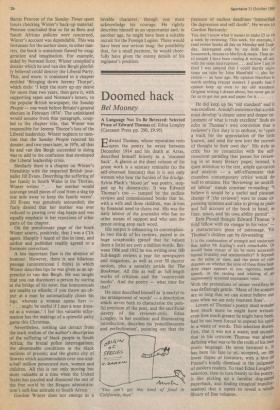Doomed hack
Bel Mooney
A Language Not To Be Betrayed: Selected Prose of Edward Thomas ed. Edna Longley (Carcanet Press pp. 290, £9.95) Edward Thomas, whose reputation rests upon the poetry he wrote between December 1914 and his death at Arras, described himself bitterly as a 'doomed hack'. A glance at the sheer volume of his prose work is a salutary reminder (to the self-obsessed feminist) that it is not only women who bear the burden of the drudge. Sylvia Plath's 'blood jet' was poetry, stopped up by domesticity. It was Edward Thomas's too — tamped by the endless reviews and commissioned books that he, with a wife and three children, was driven by financial need to churn out. His was the daily labour of the journalist who has no other means of support and who sees the pence sitting atop each word.
His output is exhausting to contemplate. In two thirds of his reviews, pasted in six huge scrapbooks (proof that he valued them a little) are over a million words. Between 1906 and 1912 he was writing over 100 full-length reviews a year for newspapers and magazines, as well as over 50 shorter notices, plus a monthly article for The Bookman. All this as well as full-length works of criticism and the 'countryside books'. And the poetry — what time for that?
He once described himself as 'a martyr to the arrangement of words' — a description which serves both to characterise the painful precision of the poet, and the sacrificial slavery of the reviewer-critic. Edna Longley, in her excellent and illuminating introduction, describes his 'punctiliousness and perfectionism', pointing out that the pressure of endless deadlines 'intensified the depression and self doubt'. He wrote to Gordon Bottomly: You don't know what it means to make £5 or £6 a week by reviewing. This week, for example, I read review books all day on Monday and Tuesday, interrupted only by my little lots of housework, lessons to Merfyn & meals. Then until tonight I have been reading & writing all day with the same interruptions . . . and now I am so tired I was amazed that I could merely enjoy some sea tales by John Masefield also for review — an hour ago. My opinion therefore is worth nothing (except money). I greatly fear I cannot keep up even to my old standard. Original writing I dream about, but never get so far as to get out pen and paper for it . . .
He did keep up his 'old standard' and it was excellent. Arnold's insistence that a critic must develop 'a clearer sense and deeper enjoyment of what is truly excellent' finds an echo in Thomas's own conviction that a reviewer's first duty is to enthuse, to 'open a track for the appreciation of the little known, and send the new into the current of thought in their own day'. His style as critic has no connection with the selfconscious parading that passes for reviewing in so many literary pages; instead, a quiet attention to the text, ample quotation and analysis — a self-effacement that countless contemporary critics would do well to emulate. His 'Reviewing: an unskilled labour' stands constant re-reading: `I believe it would be a useful and pleasant change if [the reviewer] were to cease expressing opinions and take to giving as plain and full account of the book in hand, as time, space, and his own ability permit'.
Ezra Pound thought Edward Thomas 'a mild fellow with no vinegar in his veins' — a characteristic piece of patronage. Yet Thomas's dislikes can be devastating:
It is the combination of strength and tenderness that makes Mr Kipling's work remarkable. Or would these virtues of his be more accuratelY named brutality and sentimentality? It depends on the point of view; and the point of vieW depends on whether the style of these three hundred pages appears to you vigorous, manlY speech, or the ranting and whining of an unpleasantly accented unpleasant voice.
With the pretentions of minor versifiers he was deflatingly gentle: 'Many of the sonnets are so long that we can scarce believe our eyes when we see only fourteen lines'.
Lovers of Thomas's poetry must wonder how much more he might have written, even how much greater he might have been, had he not been forced to expend his spirit in a waste of words. This selection shows, first, that it was not a waste; and second, that in his criticism Thomas was always defining what was to be the truth of his own poetic language. He never betrayed it. It has been his fate to sit, accepted, on the lower slopes of literature, with a hint of Pound's kindly dismissal in the judgment of modern readers. To read Edna LongleY's selection, then to turn freshly to the poetrY, is like picking up a familiar dog-eared paperback, and finding (magical transformation) that it opens to reveal a whole library of fine volumes.






































 Previous page
Previous page